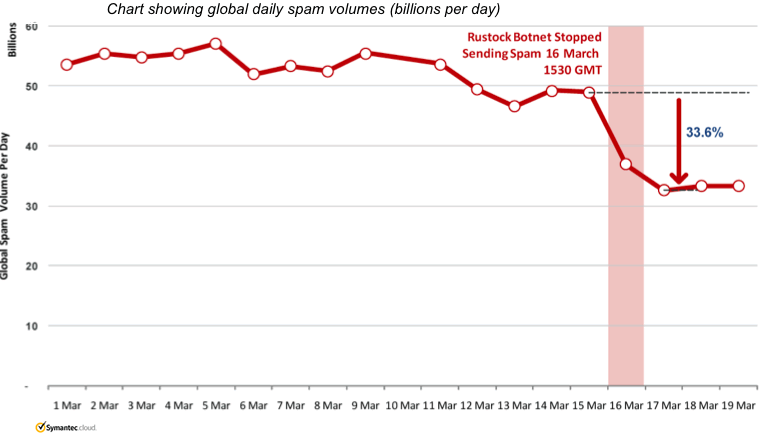Reports Show Significant Drops in Spam Levels Since Rustock Botnet Takedown – But Will Rustock Be Back?
The Rustock Botnet was sending as many as 13.82 Billion spam emails each day before being taken down early this month by an effort headed by Microsoft in cooperation with authorities and the legal system.
According to Symantec’s March 2011 MessageLabs Intelligence Report, the Rustock botnet had been responsible for an average of 28.5% of global spam sent from all botnets in March.
Following the takedown, when the Rustock botnet was no longer cranking out spam by the billions, global spam volumes fell by one-third. Toward the end of 2010, Rustock had been responsible for as much as 47.5% of all spam, sending approximately 44.1 billion e-mails per day, according to MessageLabs stats.
| Read More in SecurityWeek’s Cybercrime Section |
Since then, Bagle, a botnet that wasn’t even on MessageLabs’ top ten spam-sending botnets at the end of 2010, has taken over from Rustock as the most active spam-sending botnet this year.
In the days following the takedown of Rustock, (total) spam accounted for approximately 33 billion emails per day, compared with an average of 52 billion per day in the previous week.

“It remains to be seen whether the criminals behind Rustock will be able to recover from this coordinated effort against what has become one of the most technically sophisticated botnets in recent years,” said Paul Wood, Senior Analyst, at Symantec’s MessageLabs. “Rustock has been a significant part of the botnet and malware landscape since January 2006, much longer than many of its contemporaries.”
Shortly after the news of the Rustock botnet takedown broke, Adam Wosotowsky, principal engineer at McAfee Labs told SecurityWeek: “We have seen a decrease in Rustock levels, however it by no means has disappeared. This could be due to the botnet still running on old commands, or that lawsuits against botnet owners and associated hosting are proving successful. We are also expect the reseeding of botnets, such as McColo, as botnet operators rebuild their networks.”
Also in March, MessageLabs Intelligence analyzed the spam traffic from the top ten major spam sending botnets. Since the end of 2010, the more-active Bagle botnet has sent approximately 8.31 billion spam emails each day, the majority linking back to pharmaceutical products. Bagle does not have as many bots under its control, or spikes of traffic as large and dominating as Rustock, but its output has been more consistent.
Read More Cybercrime Columns in the SecurityWeek Cybercrime Section
In March 83.1% of global spam was sent from botnets, an increase of 6.1 percentage points compared with the 77% at the end of 2010. During 2010, botnets sent an average of 88.2% of global spam. “Botnets have been and remain a destructive resource for cyber criminals and through the years have become the spammers’ air-supply, without which it would be very difficult for them to operate. Botnets are also used for other purposes such as launching distributed denial of service attacks, hosting illegal web site content on infected computers (known as bots), harvesting personal data from them and installing spyware to track the activities of their users,” Wood said.
The full March 2011 report is available here in pdf format.








